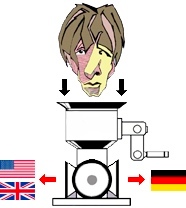| Stron w wątku: [1 2 3 4 5] > | Is translating people’s names out of date in 2022? Autor wątku: Maria Teresa Borges de Almeida
|
|---|
I’ve found on last week’s “The Economist” a fascinating article under the headline "Posh in translation", which I am transcribing here for accessibility:
(…)
“It used to be common to translate all manner of names. Scholars like Copernicus often published under Latinised names during the Renaissance (in Poland, where he was born, he was Kopernik). Translating the names of people who moved countries continued for centuries. Chopin’s friends didn’t call him Fréd�... See more I’ve found on last week’s “The Economist” a fascinating article under the headline "Posh in translation", which I am transcribing here for accessibility:
(…)
“It used to be common to translate all manner of names. Scholars like Copernicus often published under Latinised names during the Renaissance (in Poland, where he was born, he was Kopernik). Translating the names of people who moved countries continued for centuries. Chopin’s friends didn’t call him Frédéric at the pub in Warsaw; he was born Fryderyk before moving to France. Meanwhile Spain has several places named after the French writer Julio Verne, and 19th-century Spaniards got their communism from Carlos Marx. They heard about José Stalin and Adolfo Hitler into the 20th century.
The translation of names seems to belong to another era, when Europe thought of itself as “Christendom”. Translation was easy, since virtually everyone bore the name of an early saint or biblical figure, which had equivalents in most languages. Germanic names made their way across the continent with conquests by Goths, Franks and the like. Names such as Henry and Robert soon had equivalents across most of Europe too.
But today, the likes of the Royal Spanish Academy say only popes, saints, other religious figures and, yes, monarchs and their family members should be translated. That holy company is a tell: if monarchs no longer tout the divine right to rule, they (like the saints and the pope) are still a class quite apart from their subjects. Not that it is impossible to join the club, as Catalina Middleton has found out. But the odd pairing of Kate’s ordinary English surname and her translated given name captures how out-of-date translating people’s names is in 2022.
Charles I of Spain, who as Charles V reigned as Holy Roman Emperor, was born in what is now Belgium and spent much of his life fighting around Europe. He is rumoured to have said: “I speak Spanish to God, Italian to women, French to men, and German to my horse.” The quote is unauthenticated, but it is not preposterous. The Habsburg emperor’s biography recalls a time when the royals belonged to Europe as a whole as much as to any one country.
But that age is over. Perhaps it is time to give up translating monarchs’ names altogether, as out of step with the rhythm of modern nationalism. The head of the house formerly known as Saxe-Coburg-Gotha now belongs to Britain and other Commonwealth realms, not to Germany, Russia or Portugal. To call him a name he would hardly recognise seems less courteous than it might once have done. For their part, the Germans seem divided on whether to call him Der King or Der König. The second option makes more sense; titles translate even when names don’t.”
The rule in Portuguese (my native language) is to translate but the fact is that we say Rainha Isabel II (Queen Elisabeth II), Rei Carlos III (King Charles III), Princesa Ana (Princess Anne) but Príncipe William, Príncipe Harry, Princesa Kate and her children are Princesa Carlota, Príncipe George and Príncipe Louis.
So, in Portuguese it’s kind of a free for all. And what about your language?
[Edited at 2022-10-01 15:26 GMT] ▲ Collapse
| | | | Jan Truper 
Niemcy
Local time: 22:00
angielski > niemiecki
Teresa Borges wrote:
And what about your language?
For German, people's names are usually left untranslated, but often are "germanized" a bit (foreign language diacritics are left out).
In the fields that I usually work in (video games, subtitling of entertainment formats), most clients stipulate that I do not translate proper names.
| | | | Mr. Satan (X)
angielski > indonezyjski
| Just a non-European guy passing by~ | Oct 2, 2022 |
To my knowledge, there’s no nationwide rule on how to write foreign names in Indonesian, regardless of who the bearer of the name is. Excluding religious names, the common practice seems to prefer the original, complete with diacritics. Titles are of course translated when applicable.
That said, some historical figures had the spelling of their names very slightly altered. In the textbooks I’ve read, Alexander (the Great) was written as ‘Aleksander’. Or Genghis Khan�... See more To my knowledge, there’s no nationwide rule on how to write foreign names in Indonesian, regardless of who the bearer of the name is. Excluding religious names, the common practice seems to prefer the original, complete with diacritics. Titles are of course translated when applicable.
That said, some historical figures had the spelling of their names very slightly altered. In the textbooks I’ve read, Alexander (the Great) was written as ‘Aleksander’. Or Genghis Khan’s first name which was written as ‘Jenghis’. It’s never been consistent about whose name should be altered, although the spelling appear to be following a pattern which corresponds to the phonology of Indonesian. But this seems to be fairly common across languages, so it may not be as unique as I made it out to be.
I agree with Jan when the scope is limited to work practices. We audiovisual translators are usually not allowed to translate proper names or even nicknames unless there's a very good reason to do so, such as plot pertinence. ▲ Collapse
| | | |
What bothers me the most is the arbitrary use of the city names. In Turkey, the good old "Kiyef" became "Kiyev" for the good part of the 20th century and then in the 90's it became "Kiev" for unknown reasons (the exact rendition remained "Kiyev" though). Now some Turks are following suit of the English-language media spelling it "Kyiv" which I don't know how to pronounce. English is not my native tongue, so I will not be the judge of its spelling or pronunciation as long as I am not asked to use... See more What bothers me the most is the arbitrary use of the city names. In Turkey, the good old "Kiyef" became "Kiyev" for the good part of the 20th century and then in the 90's it became "Kiev" for unknown reasons (the exact rendition remained "Kiyev" though). Now some Turks are following suit of the English-language media spelling it "Kyiv" which I don't know how to pronounce. English is not my native tongue, so I will not be the judge of its spelling or pronunciation as long as I am not asked to use the spelling "Kyiv" in Turkish. ▲ Collapse
| | |
|
|
|
expressisverbis
Portugalia
Local time: 21:00
Członek ProZ.com
od 2015
angielski > portugalski
+ ...
Metin Demirel wrote:
What bothers me the most is the arbitrary use of the city names.
I don't like the way of referring to my city as 'Oporto'. It's Porto.
| | | | | convenience and tradition | Oct 2, 2022 |
expressisverbis wrote:
Metin Demirel wrote:
What bothers me the most is the arbitrary use of the city names.
I don't like the way of referring to my city as 'Oporto'. It's Porto.
As far as the foreigners are concerned, I don't care how they call the Turkish cities. Istanbul is Isutanburu in Japanese, and Stambul in some Slavic languages, and Konstantinoupoli in Greek. That's fine. These are their languages and they have their reasons to call it whatever is convenient for them. But each language should have a standard to stick with.
[Edited at 2022-10-02 22:19 GMT]
| | | |
Metin Demirel wrote:
Istanbul is "Isutanburu" in Japanese
For your curiosity, the Japanese tend to maintain the original sound of place names. イスタンブール ("Isutanburu") is the way they transliterate and pronounce Istanbul, while ミラノ ("Mirano") is the way they transliterate and pronounce Milano. This is one of the rare cases where I agree on the use of the sadly ubiquitous katakana.
But, in Germany for Milano the say "Maidland", so in revenge we call Frankfurt "Francoforte"...
[Edited at 2022-10-03 06:30 GMT]
[Edited at 2022-10-03 07:02 GMT]
| | | |
Mario Cerutti wrote:
But, in Germany for Milano the say "Maidland", so in revenge we call Frankfurt "Francoforte"...
I love the sound of Francoforte
| | |
|
|
|
| And in France... | Oct 3, 2022 |
This morning at the Japanese TV I saw during their international coverage that in France Putin is written... Poutine. If it's not a mistake, which I doubt, it's a bit weird isn't it?
| | | |
'Poutine' is not a mistake in French. It matches the correct pronunciation and avoids confusion with 'putain' (prostitute), which is pronounced the same way as 'Putin' would be.
They also typically pronounce 'Peter' the English way to avoid that it sounds like 'péteur' (someone who farts).
| | | |
Thomas T. Frost wrote:
'Poutine' is not a mistake in French. It matches the correct pronunciation and avoids confusion with 'putain' (prostitute), which is pronounced the same way as 'Putin' would be.
But, isn't "Putin" pronounced something like "puchin" in Russian? This, at least, is the way the Japanese pronounce it.
| | | |
Mario Cerutti wrote:
But, isn't "Putin" pronounced something like "puchin" in Russian? This, at least, is the way the Japanese pronounce it.
Yes, and that matches the French pronunciation of 'Poutine', except for the 'ch' sound, but people often pronounce it a bit like 'poutchine'.
| | |
|
|
|
| Geographical names in Portuguese | Oct 3, 2022 |
In Portuguese, in regard to geographical names there is another “phenomenon”: old cities that had an "established" translation but over the years have returned to the original language. For example, Oxford, Cambridge, Glasgow, Toulouse, Rouen, Lyon, Anvers, Liège, Genève, Frankfurt, Utrecht…
| | | | Tom in London
Wielka Brytania
Local time: 21:00
Członek ProZ.com
od 2008
włoski > angielski
expressisverbis wrote:
Metin Demirel wrote:
What bothers me the most is the arbitrary use of the city names.
I don't like the way of referring to my city as 'Oporto'. It's Porto.
Seamus O'Porto.
Do the English still refer to Livorno as Leghorn? Do they still do that?
Why do Italians refer to Mainz as Magonza? Why do they call London "Londra"?
Etc., etc. ad infinitum.
| | | | Tom in London
Wielka Brytania
Local time: 21:00
Członek ProZ.com
od 2008
włoski > angielski
| No, it isn't a mistake | Oct 3, 2022 |
Mario Cerutti wrote:
This morning at the Japanese TV I saw during their international coverage that in France Putin is written... Poutine. If it's not a mistake, which I doubt, it's a bit weird isn't it?
The pronunciation would be correct. I wish Americans would stop pronouncing his name "Pu'n".
| | | | | Stron w wątku: [1 2 3 4 5] > | To report site rules violations or get help, contact a site moderator: You can also contact site staff by submitting a support request » Is translating people’s names out of date in 2022? | CafeTran Espresso | You've never met a CAT tool this clever!
Translate faster & easier, using a sophisticated CAT tool built by a translator / developer.
Accept jobs from clients who use Trados, MemoQ, Wordfast & major CAT tools.
Download and start using CafeTran Espresso -- for free
Buy now! » |
| | Trados Business Manager Lite | Create customer quotes and invoices from within Trados Studio
Trados Business Manager Lite helps to simplify and speed up some of the daily tasks, such as invoicing and reporting, associated with running your freelance translation business.
More info » |
|
| | | | X Sign in to your ProZ.com account... | | | | | |




























